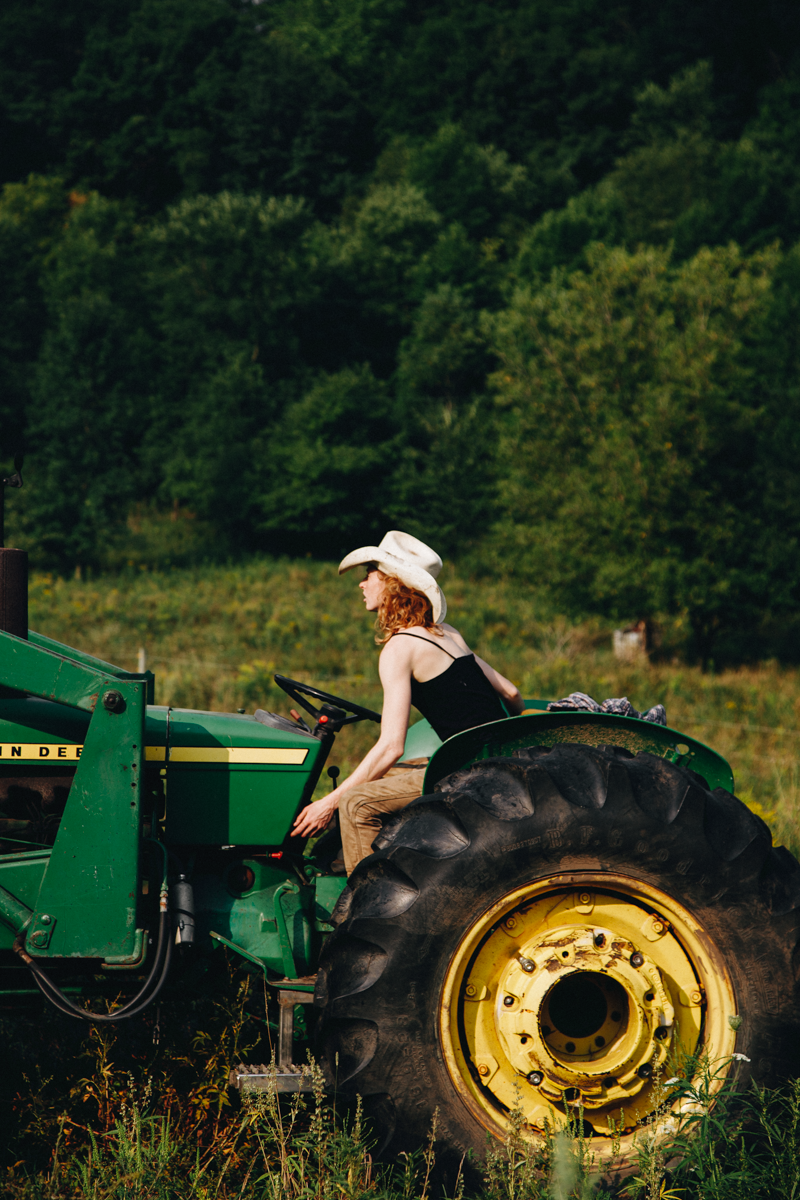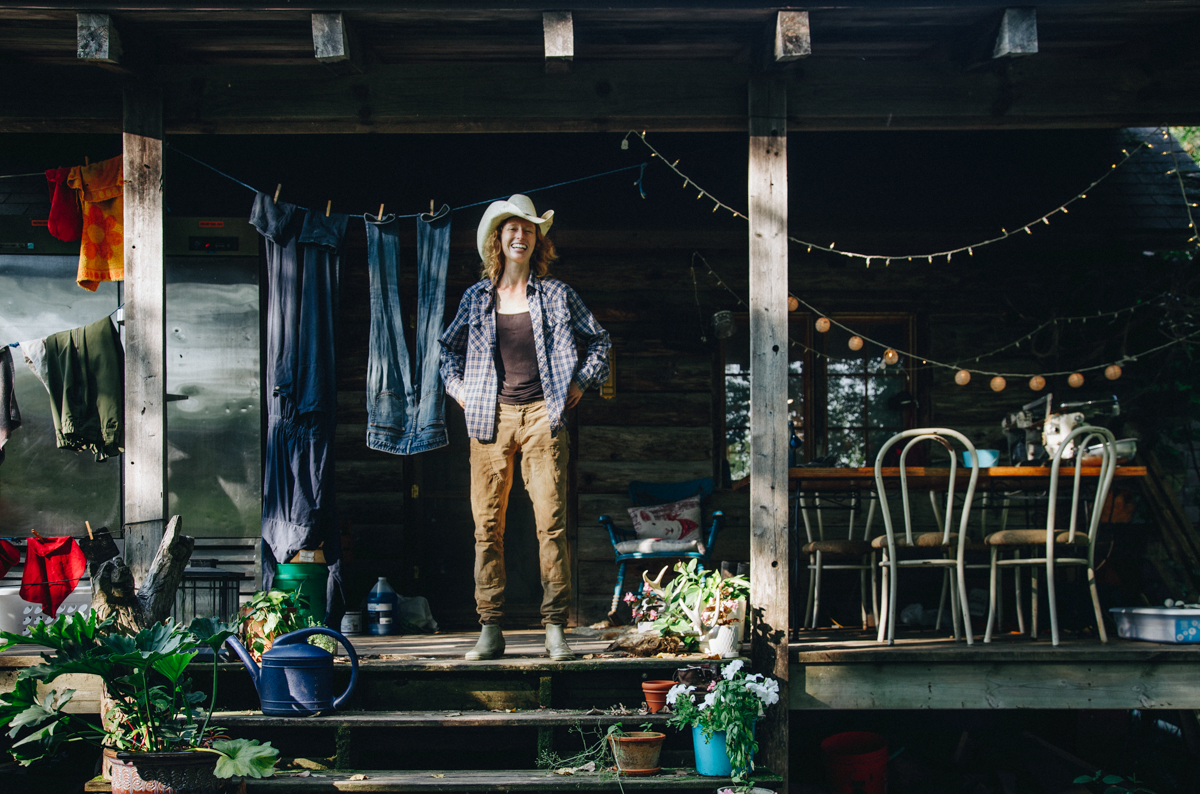Mobilizing Ethical Agriculture: Transforming Pork Production and Processing with Cannon Valley Butcher’s Block
At Cannon Valley Butcher’s Block Sarah Scheub is putting humane animal treatment, pasture health, and a vision for on-farm harvest first.
Story by Sarah Wescott | Photography and Videography by Sarah Carroll
The sun has barely crested over the wooded hills where her pigs are snoozing, but farmer Sarah Scheub is already up and bounding across the land. In Southeastern Minnesota, Sarah Schueb is building a farming business model rooted in resilience, community, and butchery services. As a new and emerging pork farmer, Sarah doesn’t yet own farmland, but that hasn’t stopped her vibrant vision from taking hold.
Sarah started Cannon Valley Butcher’s Block four years ago to provide pasture-raised pork products directly to customers. Her three beloved sows farrow piglets and Sarah raises the pigs until harvest. But she doesn’t stop there. Sarah is also a highly skilled butcher who prepares cuts and educates community members about butchery.
While her vision has been constant, Sarah has changed farming locations three times and now she’s preparing to move again. Finding a permanent farm has been a challenge.
Barriers to land access are a widespread problem for new farmers in the industry. Steep land prices, landlords’ shifting priorities, and limited capital access create a difficult environment for farmers that don’t own their own property. For Sarah, this means that she must act as a farmer, a business owner, a butcher, and a property manager as she continually seeks out soil to sow her roots.
Despite this ongoing challenge, Sarah uses animal welfare best practices to raise her pigs. Sarah’s pigs are raised on pasture, allowing them to perform their natural behaviors like rooting through the soil, freely running around, and cooling off in mud baths. Her pigs enjoy munching on their own salad bar of veggies from a local organic CSA. And, Sarah has also utilized silvopasture- the practice of integrating livestock beneath trees- so her pigs get to relax in the shade and eat wild fruit.
Sarah didn’t just stumble upon the beauty of farming; she grew up immersed in the agricultural world. Coming from a family of farmers in Ohio, she was exposed to farm life at a young age and went on to work on farms around the United States throughout her young adulthood. In 2015, she moved to New York City and began a career in retail butchery, learning the ins and outs of the butchering world.
Sarah’s committed to sharing what she’s learned from her farming and butchery experience with others. “I started Cannon Valley Butcher’s Block to share both the magic and reality of food production with my community. When you have a hand in producing, harvesting, and preparing the food that nourishes your body, you can begin to honor the life that sustains you,” she says.
For Sarah, honoring the life that sustains her means taking care of both the animals and the earth. Hence her use of rotational grazing, a practice that entails regularly moving the pigs to new areas of pasture. This principle is key to land restoration. The pigs make quick work of uprooting invasive species that prevent native grasses from thriving and they fertilize the soil with rich manure.
Where the pigs have trampled the grasses and turned new seeds into the soil, a regenerated grassland ecosystem regrows. Sarah points out the regenerated grasses, which are visibly more lush than their surroundings.
In the past, the American bison evolved symbiotically with savanna grasses. The bison ate the grasses which depended on the bison for trampling out competing plants and fertilizing. Like Sarah’s pigs in a rotational grazing system, the bison would move across the grasses quickly, never grazing one area for too long. This led to lush, healthy, grassland ecosystems that spanned the Midwest and Western plains. With the decimation of the bison population, the grassland ecosystem drastically changed.
Sarah’s farming practices help restore the land, only with pigs instead of bison. “Our lack of management was management. We created this landscape, and now it’s on us if we want to revert it back to a more productive environment for this region, which would be an oak savanna,” Sarah notes.
Land restoration is just the tip of the iceberg when it comes to Sarah’s ethical production practices. She sources organic grains to supplement the pigs’ diet, hoping to certify her pork as USDA organic in the coming years. In addition, Sarah uses cover cropping to boost soil health in her paddocks and trains her pigs to eat in the trailer that will someday take them to the slaughterhouse, reducing their overall stress.
Meanwhile, she participates in The Land Stewardship Project, The Sustainable Farming Association, and The Practical Farmers of Iowa, all a part of her identity as an advocate and activist in the farming community.
Farrowing, or breeding, is also central to the work at Cannon Valley Butcher’s Block. After years of struggling to buy feeder pigs (piglets that farmers purchase, feed, and finish for the meat market) due to limited supply, Sarah partnered with Brian Anderson of Promised Land Farm. Together the pair decided to start their own farrowing (breeding) operation and closed herd of pigs. A closed herd means that animals aren’t being introduced from new environments or farms, which is better for herd health, especially in organic production. This means that her pigs live their entire lives on her farm prior to being sent to slaughter, better for stress reduction and animal wellbeing. Given her limited land access, Sarah is also working with Blue Dirt Farm to custom finish(prepare for market) her piglets.
In most conventional pig farming, the animals are given preventative antibiotics to combat the diseases associated with intensive, confined hog farming operations. This can contribute to stronger bacteria that are more resistant to antibiotics, posing a threat to modern antibiotics that humans rely on.
Though this is less of a concern for Sarah’s pigs which are raised in the open air, she is always working to ensure her pigs are as healthy as possible, bolstering their diet with diverse foods, grains, and probiotics. On the rare occasion when one of her pigs does become sick, Sarah treats them judiciously with the necessary medicines.
Butchery is another big part of Sarah’s business. After years of formal training, Sarah prides herself on her in-depth knowledge of cuts, knives, and processing techniques. Now, she is working on the buildout of a mobile slaughterhouse unit, which will bring on-farm slaughter services to farmers around the Midwest.
Currently, there are almost no mobile slaughterhouse services available in the Midwest, and Sarah wants to fill this void. Eventually, she would like her mobile slaughterhouse services to be certified by the U.S. Department of Agriculture, which would enable the meat that she personally slaughters to be sold to the public. Most meat slaughtered on-farm cannot be sold to consumers because there is very little access to USDA-certified mobile slaughterhouse units, and getting a mobile slaughterhouse certified is incredibly difficult to achieve.
For Sarah, a mobile slaughterhouse is an intuitive next step in her journey towards the most ethical pork production possible. She has already purchased the soon-to-be mobile slaughterhouse trailer and has begun renovating it herself. This trailer will be used for personal on-farm butchery services for fellow farmers who want to eat their own meat. Down the road, she’ll grow her business with a USDA-certified mobile slaughterhouse that will process meat for public consumption. Once this project is complete, all of her pigs can live out their entire lives on one single farm, a practice almost unheard of in conventional agriculture.
Other advantages of mobile slaughterhouses include:
Reducing crowding in slaughterhouses that already have limited space and meat processing availability.
Limiting the stress on the animals as they don’t have to undergo a stressful journey to the slaughterhouse. Instead, they can live out their last few minutes of life in the comfort of the farm where they spent their life.
Improving the flavor of the meat which is less impacted by stress hormones usually brought on by transport to slaughterhouse facilities.
Of course, it takes a village to make farms like Cannon Valley Butcher’s Block a sustainable reality for farmers like Sarah Scheub. There are many ways that customers, community members, and landowners can help.
The most immediate need? Permanent land access. Do you know of available land that has a private home, pasture space, a barn or shelter for wintering pigs, water and electricity, parking for multiple vehicles, and is within 45 minutes of Northfield? Sarah Scheub would love to connect.
Wanting to purchase from Cannon Valley Butcher’s Block? You can find Sarah’s products at select farmer’s markets and drop sites in Northfield, Red Wing, Cannon Falls, Zumbrota, Rochester, and Minneapolis. You can also purchase a selection of cuts and whole and half-hog shares on her website.
For those who participate in her whole or half-hog shares, she offers a free 30-minute cut list consultation to ensure that her customers get exactly what they want and alleviate the educational burden from the butchers that currently process her hogs.
If you’re interested in learning more about the art of butchery, you can sign up for one of Sarah’s courses on her website at https://cannon-valley-butchers-block.square.site/. In the winter months, Sarah offers indoor courses at retail shops and, when the weather heats up, she offers courses on-farm.

























